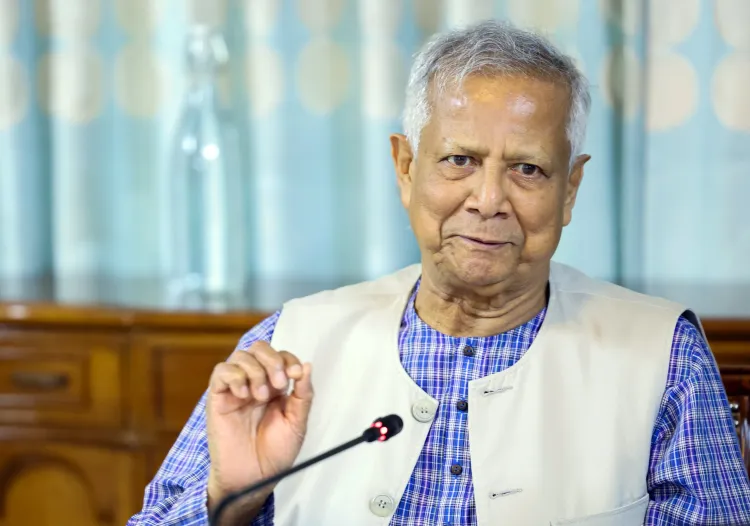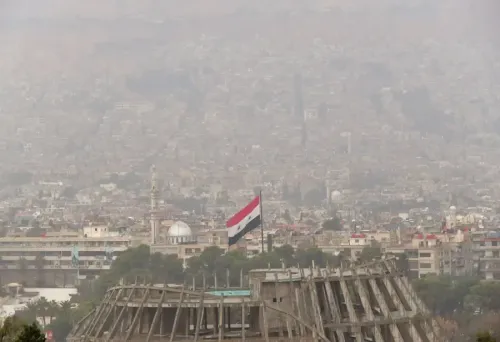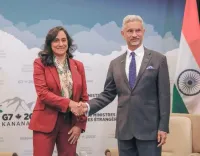Why is the Awami League Condemning the Yunus Government's Ordinance on the July Movement?

Synopsis
Key Takeaways
- The Awami League condemns the Yunus-led government’s ordinance.
- The ordinance is seen as an attempt to distort historical truths.
- Labeling protest victims as martyrs is viewed as an insult to true heroes.
- The party calls for the immediate repeal of the ordinance.
- Political narratives are crucial in shaping Bangladesh's future.
Dhaka, June 23 (NationPress) The Awami League of Bangladesh has strongly criticized the interim government led by Muhammad Yunus for enacting an ordinance concerning the July movement from the previous year, labeling it a “meticulously designed political propaganda document” intended to depict the events of 2024 as “an uprising.”
Expressing alarm over Ordinance No. 30, 2025, the party of former Prime Minister Sheikh Hasina asserted that recognizing the event officially seeks to legitimize an “unconstitutional and unethical conspiracy.”
The ordinance aims to “preserve the history and ideals” of the supposed July 2024 mass “uprising” and to provide support and rehabilitation for the families of individuals who lost their lives or were injured during the demonstrations.
Furthermore, the ordinance claims that the 1971 Liberation War was initiated due to the “systematic oppression and racial policies” imposed by the then-Pakistani government.
The Awami League emphasized that the designation of “fighters” is reserved for the heroes of the Liberation War, and the introduction of a new category termed “July Fighters” diminishes this legacy. The party characterized the ordinance as part of a move by “Yunus-aligned anti-liberation elements” to establish a parallel governance system.
In a statement, the Awami League asserted that the so-called July movement of 2024 was a media-driven propaganda initiative orchestrated by foreign NGOs and corporate entities with the intention of destabilizing the government of former Prime Minister Sheikh Hasina. They described the events as an effort to misrepresent a quota movement as a revolution.
“There was no substantial public support; it was a silent coup with Yunus at its core. He openly stated in interviews, 'Even if I don't have popular support, I have international connections' — highlighting his authoritarian attitude,” the statement continued.
“This period saw the deaths of thousands of police officers and the destruction of state assets, leading to instability and chaos in the country. We perceive this as a conspiracy against the state and its Constitution,” said the Awami League.
The party condemned the ordinance's classification of those who perished in the clashes as “martyrs,” stating that it is an affront to the Constitution and the principles of the Liberation War.
The term “Shaheed” (martyr), they asserted, is “sacred and reserved” for those who sacrificed their lives for independence.
“Many victims suffered fatal injuries to the head or neck, indicative of sniper fire. Experts from the Neuroscience Hospital, including Fuad Galib and Shamsul Arefin, confirm the presence of lethal sniper wounds among several patients. Weapon specialist Abdul Haque determined that the bullets were from military-grade sniper rifles — which the police did not possess. So, where did they originate?” the party questioned.
The Awami League disclosed that when former Home Affairs Advisor Sakhawat Hossain raised concerns regarding the 7.62mm bullets under the Yunus-led interim government, he was dismissed from his position the very next day.
The party reiterated that martyrs fight for their nation, “not for conspiracies,” adding that rehabilitating such individuals only fosters future “threats to national security.”
“The title of fighter carries immense national significance and has traditionally been reserved for Liberation War heroes. Creating a new category called 'July Fighters' undermines this legacy and is part of a scheme to create a parallel governance system led by Yunus-aligned anti-liberation factions,” the Awami League stated.
“This group encompasses opportunists from both sides of the political spectrum, acting under foreign influences. Their rehabilitation represents a misappropriation of national resources to reward conspirators,” they added.
The party emphasized that the ordinance is a document of “historical distortion and a legalized framework to unsettle Hasina's government.”
It described the ordinance as a plan against the essence of the Liberation War and a “foreign lobby-backed conspiracy to form a shadow state within Bangladesh.”
The Awami League demanded the immediate repeal of the ordinance, prohibiting any political designations like “July Martyr” or “July Fighter,” and reaffirming the ideals of the Liberation War as the sole national principles.









